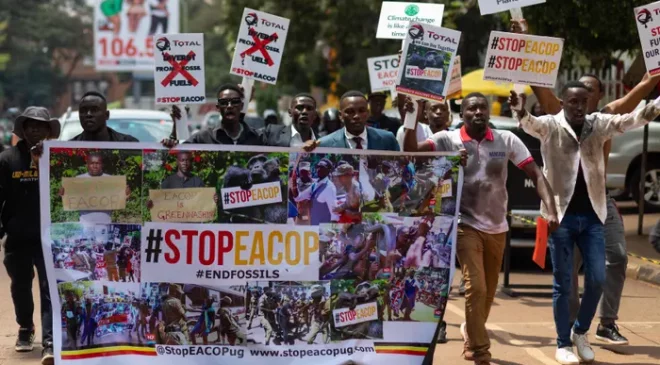
The oil pipeline is one of the most significant fossil fuel infrastructure projects under development globally. It will include hundreds of wells, hundreds of kilometers of roads, camps and other infrastructures, and a 1,443-kilometer pipeline, the longest heated crude oil pipeline in the world, connecting oilfields in western Uganda with the port of Tanga in eastern Tanzania.
The French fossil-fuel giant TotalEnergies is the operator and majority shareholder, alongside China National Offshore Oil Company (CNOOC), and the state-run Ugandan and Tanzanian oil companies. The Intergovernmental Panel on Climate Change (IPCC), the world’s leading authority on climate science, and others have warned that no new fossil fuel projects can be built if the world is to reach Paris Agreement goals and limit the worst impacts of climate change.
The activists are protesting both construction of the pipeline and the treatment of people in its path. Over 100,000 people in Uganda and Tanzania will lose their land for the oil developments. Many activists told Human Rights Watch that the constant threats from local government and security officials make it more difficult to provide support to those who have lost land.
The Ugandan authorities have routinely detained and arrested activists and human rights defenders on politically motivated charges. An environmental defender, Maxwell Atahura, described his 2021 arrest in Bullisa: “[The police] were asking me questions about oil … at a certain point they were calling me a terrorist, saboteur of government programs…. At the end they wrote on the police bond unlawful assembly.” Atahura also said that he has received threats and that he eventually relocated to Kampala for safety.
Since October 2021, at least 30 people protesting or trying to address the impacts of the oil projects have experienced politically motivated arrests in Kampala and other parts of Uganda. In 2021, the government suspended 54 organizations on the basis of vague language in the country’s Non-Governmental Organisations Act of 2016, including several working on the oil sector and other environmental issues. Local organizations that continue to work on the oil issue do so under intense pressure from government and security officials who press them via phone and in person to halt their oil sector activities.
With limited options to influence government policy, some Ugandan nongovernmental groups alongside their international partners have filed suit in France against TotalEnergies. Two people who travelled to France for a court hearing in December 2019 have experienced continuous harassment by security and government officials since their return.
Local civil society groups have become invaluable in assisting people whose land has been acquired for the oil developments to understand the compensation process and the various avenues open to them to secure fair compensation.
Due to the opposition of the pipeline from civil society organizations and climate activists in Uganda and around the world, many financial institutions and insurance companies have made a public commitment to not support the pipeline. Financing for the pipeline is yet to be finalized, although in March, a TotalEnergies official stated that the company anticipates that funding should be in place by the end of 2023.
“The construction and operation of EACOP poses grave environmental risks, human rights risks, and contributes to the global climate crisis.” Horne said. “Financial institutions and insurance companies should avoid supporting the Ugandan oil pipeline due to the devastating impacts of fossil fuels on climate change as well as future risks of serious human rights impacts.”
